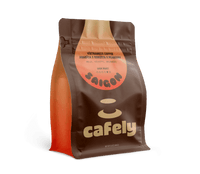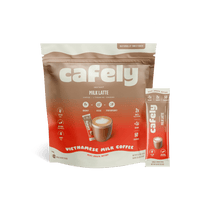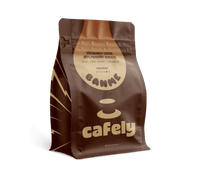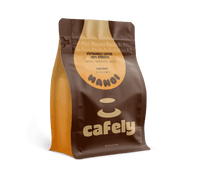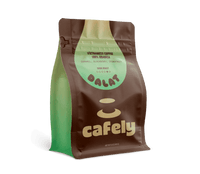Coffee impacts your system in a number of ways. Technically, it’s the caffeine in coffee that has the most noticeable effects, giving you the mental clarity and energy boost that you’re likely familiar with.
How else does coffee, and caffeine, more specifically, interact with your system?
Science says that the largest impacts of caffeine can be felt on two systems specifically: cardiovascular and nervous.
Caffeine & Blood Pressure
Caffeine is a potent stimulant that can temporarily raise blood pressure.
While individual responses vary, studies show that coffee increases systolic blood pressure by 3–15 mmHg and diastolic by 4–14 mmHg.
This effect usually begins within 30 minutes, peaks between 1–2 hours, and can last over four hours [7].
Why It Happens: The Role of Enzyme Inhibition
Caffeine likely increases blood pressure by inhibiting enzymes in the body called phosphodiesterases.
These enzymes regulate blood vessel function, and their inhibition can lead to vasoconstriction, or narrowing of blood vessels — a known cause of elevated blood pressure.
This theory is supported by the fact that nonxanthine phosphodiesterase inhibitors (which are chemically similar to caffeine) are used as cardiac stimulants and bronchial relaxants [5].
Long-Term Effects: It's Not the Caffeine
Earlier studies suggested caffeine might reduce the long-term risk of high blood pressure, but newer evidence points elsewhere. Chlorogenic acids, a group of antioxidant compounds found in coffee, have been shown in experimental studies to exert anti-hypertensive effects, and are likely responsible for coffee’s potential cardiovascular benefits — not caffeine itself [6].
Who Should Be Cautious?
For most healthy individuals, this temporary blood pressure spike isn’t harmful and doesn’t contribute to long-term hypertension.
However, if you have existing cardiovascular issues, high blood pressure, or are pregnant, it’s wise to consult your healthcare provider about how much caffeine is appropriate for you.
Caffeine & the Nervous System
Caffeine’s effects mainly come through its interaction with the adenosine receptors in your brain. Adenosine is a hormone that binds with receptors in your brain, making you feel tired.
Caffeine blocks these receptors and keeps the adenosine from binding, which prevents you from feeling sleepy.
It’s important to note that caffeine doesn’t actually give you an energy boost in this system; it just makes you feel as though you have more energy.
Which Factors Influence Coffee’s Effect on Blood Pressure?

As with all things biological, there is rarely an exact number dictating how much coffee will or will not influence someone. Instead, caffeine might impact someone to varying degrees depending on a number of lifestyle factors.
Caffeine doesn’t interact with everyone in the same way, so let’s briefly discuss some key factors that can change how coffee influences your system.
Tolerance
The most obvious factor that influences coffee’s impact on blood pressure is caffeine sensitivity.
Regular coffee drinkers will build a tolerance to caffeine over time, including to its vasoconstricting effects.
If someone has never had caffeine or has avoided caffeine for a while, they won’t have this same tolerance level.
Sensitivity
This tolerance level can also be slightly different from person to person because of genetics and metabolism. One individual may be predisposed to have a more intense reaction to caffeine than another.
It may take some people more or less time to metabolise caffeine, directly influencing how quickly and readily it impacts them.
Frequency of Use
A user’s coffee consumption patterns should also be considered when talking about the effect on their blood pressure.
The FDA’s recommended daily limit for caffeine intake is 400 mg, which is approximately equivalent to four cups of coffee.
Since caffeine’s impact on blood pressure is typically short-lived, separating out those four cups of coffee throughout the day might not have a notable impact on blood pressure. Drinking them all at once, however, may have a more profound and dangerous effect.
General Health
Of course, coffee isn’t the only thing that can impact your blood pressure. Other things that often push the number up are stress, being overweight, and having too much salt in your diet.
While the exact relationship between each of these things is hard to quantify, it’s likely that someone who drinks a lot of coffee and also eats a lot of salt will have elevated blood pressure.
As with many different aspects of health, the best approach to blood pressure management is likely a holistic one.
Consider all the common factors that can impact blood pressure, and question how those factors are present in your life. By reducing several factors by just a little, you can have a more powerful overall effect.
Safe Coffee Consumption for Blood Pressure Management
When you read about the impact coffee, or any other substance, can have on your health, it’s natural to want to ameliorate things somewhat.
It’s important to remember that while coffee can temporarily spike blood pressure, the effects aren’t long-lasting and are typically not dangerous to most people.
Caffeine & Coffee Limits
However, if you’re concerned about your blood pressure and you’re looking to make changes in your lifestyle, coffee can be a great place to start.
First of all, consider how much coffee you drink regularly and whether you might be able to decrease that amount.
A commonly recommended daily limit is 400 mg of caffeine, which is roughly four cups of black coffee. If you drink more than that, cutting back could be a good first step in blood pressure management.
Coffee Beans
You could also consider switching the coffee that you regularly drink. Different varietals of coffee can contain slightly different amounts of caffeine.
For instance, robusta beans contain twice as much caffeine on average compared to arabica beans, so making the switch to 100% arabica could be a small but powerful change.
On top of the caffeine change, you’ll likely also notice some delicious flavors that are up for grabs in arabica beans — dark roast arabica can be packed with caramel, berry, and stonefruit notes that make it super moreish!
Additives & Caloric Intake
Another way to adjust your coffee habit for the sake of your blood pressure is to change what you add to your coffee. As we mentioned above, being overweight is associated with higher blood pressure.
By reducing the caloric intake that you’re getting in each cup of coffee, you can reduce the number of calories you’re getting throughout the day. Small changes like this can add up and, over time, you can lose some weight and see commensurate benefits with your blood pressure.
For instance, you could switch away from sugar and highly caloric syrups, and instead opt for natural sweeteners that have fewer calories and some additional benefits on top.
Coffee drinks sweetened with organic monkfruit, for instance, can give you a complex and tasty sweetness without the calories of sugar.
Debunking Myths About Coffee & Blood Pressure

Both coffee and blood pressure can be very complex topics. To keep things as straightforward as possible, we want to debunk some common myths around the two and help you learn a little more.
Myth: Coffee Causes Hypertension
Hypertension refers to consistently elevated blood pressure over time, which can increase the risk of serious cardiovascular issues. While coffee can cause a temporary rise in blood pressure, this effect is generally modest and returns to normal within about three hours.
Studies show that this temporary increase occurs in both people with normal blood pressure and those with hypertension — but these short-term changes don’t qualify as hypertension and are typically within safe limits.
Additionally, regular coffee consumption tends to have a reduced effect on blood pressure, likely due to the tolerance developed with habitual caffeine intake [2].
Myth: Decaf Coffee is Caffeine-Free
Decaf doesn’t mean zero caffeine — it just means less. While the decaffeination process removes most of the caffeine, trace amounts remain in all decaf coffee.
One study tested decaf drinks from Starbucks and found 3.0–15.8 mg of caffeine in decaf espresso shots, and 12.0–13.4 mg in 16-oz brewed decaf coffee [3].
That’s far less than the ~100 mg in a regular espresso, but still notable if you’re sensitive to caffeine or have been advised to avoid it.
This is especially important for people with heart conditions or those taking medications that interact with caffeine, such as anti-anxiety drugs.
Myth: Coffee Harms the Heart
Because caffeine can temporarily raise blood pressure, some believe coffee is bad for heart health. But research shows this short-term spike doesn’t lead to long-term harm, especially in healthy individuals [2].
In fact, regular coffee consumption may offer cardiovascular benefits. Studies suggest that drinking 3–5 cups per day may reduce the risk of heart disease by up to 15%, and could even lower the risk of premature death [4].
While coffee’s effects can vary due to its complex mix of compounds, many researchers believe its overall benefits outweigh potential drawbacks for most people [2].
When to Consult a Doctor About Coffee & Blood Pressure
If you have concerns about your health and you're experiencing upsetting or uncomfortable symptoms from drinking coffee, it may be time to contact a medical professional for specialized and tailored advice.
Here, we’re going to give you some key symptoms to keep an eye out for — by being informed about the potential risks to your system, you can be empowered to seek out help when you need it.
We’re not here to scare you by presenting a list of scary potential side effects! Instead, we want to help you take care of your body.
Caffeine Sensitivity
There are some key symptoms of caffeine sensitivity that it can pay to bear in mind.
After consuming caffeine, those sensitive to it may experience some minor dizziness, anxiety, or a slightly elevated heartbeat.
With time, those symptoms should go away, and you’ll return to normal, aware of this sensitivity and able to moderate your intake accordingly.
Pre-Existing Conditions
Caffeine affects everyone differently — and for those with pre-existing conditions, even small amounts can have a bigger impact.
If you have hypertension, heart disease, or are pregnant, your baseline blood pressure may already be elevated. In these cases, caffeine can potentially raise it further, increasing the risk of complications.
If you’re unsure how caffeine might affect you, it’s best to consult a healthcare provider. A quick conversation could help you avoid unnecessary risks.
FAQs: Coffee & Blood Pressure
Now that we’ve gone through the science behind interactions between coffee and blood pressure, here are some common FAQs to clear up a few final things.
1. Can I Drink Coffee if I Have High Blood Pressure?
Generally, it’s safe to drink coffee in moderation if you have high blood pressure. However, if your doctor advises otherwise, follow their advice.
2. How Long Does BP Stay Elevated After Coffee?
Blood pressure tends to stay elevated for one to three hours after consuming caffeine.
3. Can Drinking Lots of Water Reduce Blood Pressure?
It may not reduce pressure immediately, but staying hydrated can help regulate blood pressure.
4. Does Sugar Raise Blood Pressure Quickly?
Yes, sugar can cause a spike in blood pressure if you have a lot in a short space of time.
5. How Many Hours Does Coffee Raise Blood Pressure?
The effects of caffeine can last for around three hours, though this can vary from person to person.
6. Can I Drink Coffee While on Blood Pressure Medication?
Coffee and caffeine are known to interact with certain medications, so ask your doctor if it’s safe to drink coffee while on your particular medication.
7. Can You Drink Coffee Before a Blood Pressure Test?
It’s not a great idea to drink coffee before a blood pressure test, as it can temporarily raise your reading.
8. How to Flush Caffeine Out of Your System?
Over time, your system will metabolise caffeine to break it down and remove it — simply drink water and rest.
9. Will Quitting Coffee Lower Blood Pressure?
Quitting coffee outright may lead to a slightly lower average blood pressure over time.
10. How Can I Bring My BP Down Quickly?
Hydration and rest are both good options to rapidly reduce your blood pressure, as well as meditative deep breathing.
References
- Institute of Medicine (US) Committee on Military Nutrition Research. Caffeine for the Sustainment of Mental Task Performance: Formulations for Military Operations. Washington (DC): National Academies Press (US); 2001. 2, Pharmacology of Caffeine.
- Chrysant, S. G. (2017). The impact of coffee consumption on blood pressure, cardiovascular disease, and diabetes mellitus. Expert Review of Cardiovascular Therapy, 15(3), 151–156.
- McCusker, R. R., Fuehrlein, B., Goldberger, B. A., Gold, M. S., & Cone, E. J. (2006). Caffeine content of decaffeinated coffee. Journal of Analytical Toxicology, 30(8), 611–613.
- Rodríguez-Artalejo, F., & López-García, E. (2018). Coffee Consumption and Cardiovascular Disease: A Condensed Review of Epidemiological Evidence and Mechanisms. Journal of agricultural and food chemistry, 66(21), 5257–5263.
- Echeverri, D., Montes, F. R., Cabrera, M., Galán, A., & Prieto, A. (2010). Caffeine's Vascular Mechanisms of Action. International journal of vascular medicine, 2010, 834060.
- Grosso, G., Micek, A., Godos, J., Pajak, A., Sciacca, S., Bes-Rastrollo, M., Galvano, F., & Martinez-Gonzalez, M. A. (2017). Long-Term Coffee Consumption Is Associated with Decreased Incidence of New-Onset Hypertension: A Dose–Response Meta-Analysis. Nutrients, 9(8), 890.
- Mort, J. R., & Kruse, H. R. (2008). Timing of blood pressure measurement related to caffeine consumption. The Annals of Pharmacotherapy, 42(1), 105–110.
